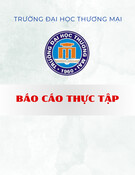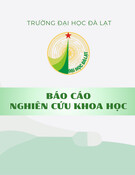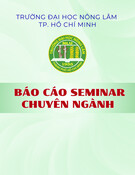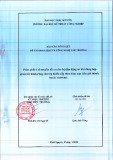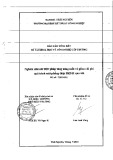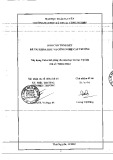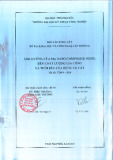J. Sci. Dev. 2011, 9 (Eng.Iss. 1): 63 - 74 HANOI UNIVERSITY OF AGRICULTURE
CUrrent Situation and PROPERTY RIGHTS to agricultural and Unused LANDS IN THE UPLAND areas OF CENTRAL VIETNAM
Thực trạng và các quyền trên đất nông nghiệp và đất chưa sử dụng vùng đồi núi miền Trung Việt Nam
Huynh Van Chuong
Hue University of Agriculture and Forestry Corresponding author email: huynhvanchuong@huaf.edu.vn Received date: 23.01.2011 Accepted date: 14.05.2011
TÓM TẮT
Nghiên cứu nhằm xác định hiện trạng việc quản lý và sử dụng đất nông nghiệp và đất chưa sử dụng vùng đồi núi miền Trung Việt Nam. Nghiên cứu dựa vào khung phân tích các gói quyền về sở hữu tài sản và tìm hiểu thực tế thông qua công tác điền dã và thảo luận cùng các nhóm đối tượng quản lý và sử dụng đất có liên quan gồm nhà nước, cộng đồng và hộ gia đình. Kết quả nghiên cứu đã phân tích việc thực hiện và các hoạt động của gói quyền đối với người dân và nhà nước trên đất nông nghiệp và đất chưa sử dụng, xác định và phân loại được nhóm quyền chính thống và không chính thống nhưng vẫn tồn tại trên hai loại đất trên tại địa bàn nghiên cứu, làm rõ lý do của việc tồn tại và ảnh hưởng của các quyền trên đến việc khai thác sử dụng đất của người dân. Nghiên cứu cũng đánh giá được hiện trạng và sự biến động đất đai nói chung, đất nông nghiệp và đất chưa sử dụng nói riêng qua các năm từ 2000 - 2008, nguyên nhân của sự biến động đất sản xuất nông nghiệp và đất chưa sử dụng, cơ cấu cây trồng, bên cạnh lý do có sự thay đổi chính sách đất đai của Nhà nước, một lý do quan trọng nữa đó là sự chuyển đổi cơ cấu và khai thác đất tự phát để mưu sinh của người dân vì sự tác động của chuyển dịch kinh tế chung của huyện và nhu cầu của thị trường nông sản phẩm.
Từ khoá: Bó quyền tài sản, chính thống, đồi núi, không chính thống, thay đổi sử dụng đất.
SUMMARY
The present research aimed at identifying the status of the management and use of agricultural and unused lands in the upland areas of Central Vietnam. This research was based on the bundles of property rights analysis framework and on field investigations. The research results demonstrated the implementation as well as activities of the bundles of property rights by the local people and the State for agricultural land and unused lands, identified and classified the existing formal and informal rights relating to the two types of land in the survey location. In addition, the reasons of the existence as well as the impact of the rights to the land utilization of the local people were clarified. The research has evaluated the status and changes of land in general and agricultural land and unused land in particular, from 2000 to 2008. The reasons are the changes in the land policies of the State, the spontaneous changes in crops and land utilization by people for earning their livelihood due to the general economic changes in the district and the demand of the agricultural product market.
Key words: Formal and informal issue, land use change, property rights.
63
Current Situation and Property Rights to Agricultural and Unused Lands in the Upland...
1. INTRODUCTION
in
management and use of agricultural land categories in upland areas differ from other regions because of largely different ecosystems and ethnic matters. Unused land comprises land for which a use purpose has not yet been determined (Vietnamese National Assembly 1987, 1993, 2003). However, various land users have accessed to and utilized this type of land for diverse purposes, as well as benefited from cultivation and utilization on it, except for un-cultivatable areas. The management and use of unused lands are complicated and changing terms of management actors, regulations, and benefit sharing and distribution by laws.
Property is perhaps the most confusing term in the literature; and yet an understanding of property and property rights, its complexity, and its politics (Nguyen, 2005). The term property is commonly used in the current daily language to refer assets, or things (Bromley, 1992; Hann, 1998, MacPherson, 1978). Property theorists define property as a right in the sense of a claim to a benefit stream (Commons, 1990; MacPherson, 1978; Meinzen-Dick and Knox, 1999) although the wording differs slightly from author to author. The term property right is used to make the connotations of property clear (Bruce, 1993). In contemporary writing, however, these two terms are used interchangeably.
Studying changes in the management and use of agricultural and unused land in combination with livelihood and natural resources management will provide differences in policies, formal rights and informal rights, and how local people manage natural resources and benefit from management and use.
2. MATERIALS AND METHODS
2.1. Situation and geographical setting
to
The chosen target survey area for this research is Hong Bac commune, Thua Thien Hue province, bordering the Laos People’s Democratic Republic (Fig. 1). Hong Bac is among the poorest communes of A Luoi district in which 68% of the households are the poor ones and almost 100% of the inhabitants are of the ethnic minority (Paco). Total natural area of the commune is 3152.99 ha, in which agricultural land is 380.85ha, forestry land is 2352.60 ha, non - agricultural land is 130.00 ha, and the rest, 276.71 ha, is the area of unused land.
to Bundles of property rights, according Schlager and Ostrom (1992), consist of five classes: rights of access, rights of withdrawal, rights of management, rights of exclusion, and rights of alienation. Right of access is defined as the right to enter physical property while the right of withdraw is the right to obtain the products of a resource; right of management is the right to regulate internal use patterns and transform the resource by making improvement; right of exclusion is the right to determine who will have an access right and how that right may be transferred; and right of alienation is the right to sell or lease either or both of the both of the above rights (Schlager and Ostrom, 1992). Besides that, holders of property rights can be the state, communities or individuals. Depending on the prevalent resource manager, these types of property can be classified into state property, communal property or private property (Bromley, 1989, 1992; Feeny et al. 1990; MacPherson, 1978). However, according to Vietnamese land law (Vietnamese National Assembly 1987, 1993, 2003), state property and communal property are determined as common property of state.
Management and use of agricultural and unused land have experienced several historical periods of Vietnam policies along with the socio- economic development of the country. Therefore, they are comprehensively affected by Government policies.
The incomes of the local people depend mostly on agricultural production, mainly wet rice and upland rice. Only average households or those received fund supports from development projects have additional incomes by animal breeding. Therefore, it is extremely essential for A Luoi district in general and for Hong Bac commune in particular to properly utilize and use agricultural and unused to obtain land resources so as sustainable livings and food safety for each household and the local community. Hong Bac commune has 5 villages. The basic information on natural and socio-economic conditions of the investigated villages of Hong Bac commune is presented in Table 1. Agricultural land plays a very important role to farmers and the local in economic and social development from central to localities. Hence, the agricultural land has been taken into account by Government’s policies leading to the well-regulated and stable management manner. However, the
64
Huynh Van Chuong
TH UA THIEN HUE PROVINCE
VIETNAM
A LU OI D IS TRICT
Figure 1. Location of study site
Contents
Le Ninh 3.5 73.5 490 117 4.2 2 Paco
Le Loc 1 2.5 72.5 388 92 4.2 2 Paco + Kinh
Le Loc 2 3.0 73.0 510 111 4.6 3 Paco + Kinh
Tan Hoi 4.0 74.0 320 68 4.7 3 Paco
A Soc 2.5 72.5 212 48 4.4 2 Paco
Table 1. Summary of background information at 5 villages participated in the case study
Geographical conditions Distance to district center (km) Distance to province center (km) Population and demography Population Number of households (HH) Average HH size Average number of labors Ethnic group Village leadership structure
State system
Five people in the position of village leader, vice leader, youth union leader, woman union leader and village police One village oldman (Già làng)
0.3
0.5
0.2
0.3
0.3
0.1
0.15
0.1
0.1
0.12
Rice (dry and paddy), cassava, maize
Traditional system Agricultural land Average dry land per HH (ha) (Upland and home garden) Average paddy rice per HH (ha) Main crops
Major sources of off-farm
State salary
State salary
Work for coffee company, state salary
State salary, trading and service
49 25
State salary, trading and service 45 10
40 16
54 13
23 13
Number of very poor HHs Number of poor HHs
Source: Field work
65
Situation and Property Rights of Agricultural and Unused Lands in the Upland...
2.2. Methodologies
This research applied “Bundles of property rights analysis framework” as a core direction to analyze management and use rights of agricultural and unused land. Based on that framework, formal informal management and use right for and different actors are defined and specified.
issues relating
This study was analyzed based on the two main following documentary sources: the literature source gathered from the available documents and the data collected in the research areas. In order to collect the data in the research areas, study applied the following methods: Agricultural and unused lands walks; Village walks, Participatory mapping; Group discussion; Consultant meetings with local authorities and other stakeholders and interview with land officials; and household survey. the
3. RESULTS AND DISCUSSION
belonged to the common ownership of the whole community and are under the management of the government. Until the land laws promulgated in 2003, land in general was under the possession of the government but the inhabitants have the right to use it. The conversion from common management and use as the common property of the locality to governmental possession and management in accordance with land laws and related laws has to people’s developed several awareness, management matters and life earnings . This led to significant changes and fluctuation among the various categories of land, especially agricultural land, forestry land and unused land. The changes of land use structure, in one hand, brought about certain benefits for both the people and the land administrator. On the other hand, they revealed local several problems, especially when conventions or customs were no longer valid and were completely replaced by government laws and policies, while the local people were lagged behind in approaching the information. 3.1. Policies on agricultural land and unused land to be applied at the study area
this situation, the government
From the 1980s to the first few years of the 1990s, the area of forestry land and agricultural land dropped significantly, whereas the area of unused land rapidly increased due to uncontrolled land degradation. utilizeutilization and quick Facing issued several laws and policies so as to enhance the governmental management of land, to maintain and reduce the rate of loosing forests, especially natural forests, and to find ways to utilize unused land. The objective of all these policies was to bring about effects and benefits in terms of economy, society and environment. Some policies had great impact to the management and use of agricultural and unused land at Hong Bac commune, as presented in Table 2.
the
Hong Bac commune was established in 1993 with 4 villages, including Le Ninh, Le Loc 1, Le Loc 2 and Tan Hoi. By the end of 1993, A Soc village was separated from Hong Nam commune (currently known as A Luoi town) and merged into Hong Bac commune. Before the promulgation of governmental laws and policies on land, in the 1980s and in the first years of the 1990s, most of the natural resources like cultivated land, timber forest, rivers, springs, lakes or wild animals,… were considered as common properties of the whole community. The management and utilization of these resources were based on the spontaneity of each family line and on the customs or convention approved by the local people. Through interviewing the elder people at the villages, most of the interviewees stated that at that time they were bound by no policies of the government or rare management of local authorities. The agricultural cultivation was mainly by nomadic farming or utilizing wild products in the forests for living.
By analyzing the policies and laws applied to land in general, and agricultural and unused land in particular, at Hong Bac commune, it shows that the land law of 1993, the decree 64/CP , and the decree 02/CP which was later replaced by decree 163/CP have significantly changed the management and use of agro-forestry land and unused land resources of the commune. These policies have partially helped the local people to have sustainable and long-term right to use agricultural and unused land for other purposes, particularly for agro-forestry purposes which are approved by the government. Since the promulgation of the land laws in 1993 and the laws on forest protection and development in 1992, the utilizeutilization and use of agricultural and unused land at the locality have been affected. Most of the land resources as well as properties on land were inventoried by the government. They
66
Huynh Van Chuong
Year
Documents
1992 Forest protection and development law
1993 Land law
1993
Decree No 64/CP Regulating the allocation of agricultural land to organizations, households, and individuals for long term and stable use for agricultural purpose
1994
Decree No 02/CP Regulating the allocation of forestry land to organizations, households, and individuals for long term and stable use for forestry purpose.
1995
Decree 01/CP Regulating the allocation of land for agricultural, forestry, and aquacultural productions in State Enterprises.
1999 Decree 163/CP Regulating the allocation for forest and forestry land (replace the Decree 02/CP)
2003 Modified land law
2004 Modified forest protection and development law
2004 Decree 181/CP Instructions for implementation of land law 2003
Source: A luoi district and Hong Bac commune
Table 2. Policies on agricultural land and unused land to be applied at the study area
Table 3. Situation and fluctuation of land resources at Hong Bac commune 2000-2008
Content
2000
2005
2007
2008
2000/2008
Total area
3151.00 3151.00 3152.99 3152.99
+1.99
Agricultural land
389.00
410.20
374.70
380.85
-8.15
Forestry land
1825.28 2069.90 2352.60 2352.60
+ 527.32
Non-agricultural land
88.63
99.87
138.66
138.00
+49.37
Unused land
848.09
567.03
283.18
276.71
-571.38
Source: Hong Bac statistic office
Unit: ha
3.2. Practices of changes of agricultural and unused land in Hong Bac commune (2000 - 2008)
these two categories of land. Because every year, in order to increase the food supply so as to meet the demands for 12 months, the local people have the tendency to use forestry-oriented area to grow agricultural crops, especially upland rice and cassava. Whereas, those households with better economic conditions or realizing the value of forestry economy have shifted the area from upland rice and cassava to acacia. Therefore, the annual statistics of land use forms can only reflect the actual situation. In reality, there are still other differences due to spontaneous land use shifting by the local people. And this is one of the things that local people think they have the right to do. This issue will be analyzed and clarified in latter part of the paper. The data in Table 3 and Figure 2 show that total area of natural land of the commune is 3152.99ha and is slightly different from that of 2000 due to shifting from manual measurement and calculation methods to modern methods. There is a relative difference between the areas of agricultural land in 2005 with that of the other years. The reason is in 2005, many households utilize fallow land for growing upland rice and cassava, however, a few years later, these land areas were planned by the government and converted to forestry . The fact is there is a rotation of forestry land and agricultural land, and it is very difficult for the government to identify and control the areas of
67
Situation and Property Rights of Agricultural and Unused Lands in the Upland...
Figure 2. Current land use in Hong Bac commune in 2000 and 2008
Figure 3. Current unused land in Hong Bac commune in 2000 and 2008
daily livings. Reality investigation shows that the utilizeutilization of unused land is spontaneous. Regarding unused land, in reality, it is impossible to identify its specific border in order to relegate the management to each village. In effect the management is general for the whole commune. In terms of state management, people of village A have the right to utilize unused land of village B for agroforestry purposes and generation of income if the unused land of village B is still unutilized and not owned before that and under the condition that the communal and district authorities have given permission. However, this is usually done in a different way – the people automatically utilize There were great changes in the area of unused land from 2000 to 2008 (Figure 3). According to statistics, in 2000, the area of unused land at the commune was 848.09ha, the number dropped down steadily every year and by 2008, there was only 276.71ha of unused land. The reasons for the rapid decrease are that: in one hand, unused land was planned by the government and transferred to the forestry land; in the other hand, the local people reclaimed themselves for plantation and after that these areas were regularized by the government as agricultural land. The fact that the area of unused land decreases is a positive signal and the local people mainly utilize this land for improving their
68
Huynh Van Chuong
are working on. In order to enhance the awareness of the people about registering land use right and receiving land use certificate, authorities of all levels must organise propaganda programs about land laws to clearly explain the rights in the land use certificate. This makes certificate. use
utilize the land and do farming if they know that the unused land is not owned by anyone and after some croppings or some years of farming, the state shall formalize the right of land use for them or they inform the authorities of this to be granted with the the land utilizeutilization of unused land in Hong Bac commune differed among the households and it is the household having the intention of utilizing unused land that decides on the quantity, location and area of the utilized land.
3.3. Property rights of agricultural and unused land time, long
3.3.1. Situation of granting land use certificate for agricultural land and unused land
land area The agricultural
for
In terms of unused land, the local people still have not been granted with land use certificate, they mainly set the boundaries and localiseby themselves, then utilize or work on that land, some even localise the land and then leave fallow with the hope that if they do have the capability to utilize now, they will leave it to their children later when they get married. As for the area of unused land which has been reclaimed and utilized for a the government will regularize by measuring the area, identifying the name of householders and then assigning the land to them with clear production purposes so that they can work for long term. However, as for the local people, the fact that the land is assigned for agricultural purposes or forestry purposes is not important. The demands and price of the market determine which agricultural crops or forestry trees to grow, as analysed above. This indeed creates so many difficulties the management work as well as overall and detailed plan of the commune and district.
inheritance and transfer to
is now being surveyed, measured and set boundary for separated paddy fields on the map by the government. However, currently, the map is still at district level, not commune level, and the area has not been granted with land use certificate. When being asked whether they wanted to have Land use Certificate for the area of dry crops, most of them showed the unconcernedness. If the government issue, they will get it. However, it is not so necessary because it is their land with clear actual landmark and no one are allowed to change it. However, there are still some people who are aware of the importance of the land use certificate in settling any arising dispute about land later on, without this certificate, they do not know how to sue due to no availability of proof. As for the Government, the expense for surveying work and issuing the land use certificate at the research area is taken from the state budget, the local people do not have to pay anything when receiving the certificate or when their land is being surveyed. However, this still does not make the people more enthusiastic in registering land use and receiving certificate. The basic reason is that the local people do not understand the benefits of properties rights as well as do not have the needs of using these rights. Even with their descendants, it is just verbal agreement without any notice or information for the local authorities so as to split or transfer the land use certificate.
uncontrolled stabilise
secure once feel can The allocation of agricultural land and unused land for long-term stability in this household almost impossible under the general policy of the state as a plain piece of land must be "have good soil, poor soil, have near land, have far land" which is mainly the land according to history, voluntary state as land which has been the exploitation of land to household production over the years, state only measures and immediately transferred the land which previously did households, there is no disturbance, such as common policies on land. This, in one hand, can avoid conflicts and contradictions among the inhabitants. On the other hand, it shows that the government has respected the local conventions. Moreover, the assigning of agricultural land and unused land here can not apply the same rule of household and number of people in the household as that in the plain area, because as mentioned above, we cannot take the land of this person to give to another one while the land fund reserve is no longer available. Thus, some big households have smaller land due to the fact that they did not utilize fallow land before. According to the survey, most of the area of land of all kinds of each household is less than the limit of In terms of land management aspect, the measurement and issue of land use certificate can land the partially utilizeutilization and use situation, and the local people receiving government’s recognition about the land that they
69
Situation and Property Rights of Agricultural and Unused Lands in the Upland...
30ha prescribed by the government, thus it is very difficult to withdraw their land.
3.3.2. Description of property rights of agricultural and unused land at Hong Bac commune
stated
the and perform
the paddy
raise the commune fund. According to the local people, it is obvious that they can utilize their land and enjoy all the benefits it brings about. The more or less the benefits are depends on the capability of intensive cultivation of different households. Some households can utilize the land of other people with either of the 2 conditions: the land owner lends his land to another person for 1 crop or 1 year or 2 years, then the borrower can utilize and harvest on that land without paying any fee to the lender; or, the land owner rents his land to the lessee for a couple of years, and the lessees has to return the land back if required by the land owner, in this case the lessor has to pay rental fee. However, the latter hardly happens, normally, the local people lend or borrow the land together for cultivation. The land borrowing often occurs among the relatives or children within 1 clan or family. Unused land can also be utilized for the purpose of breeding cattles. However, one person cannot use other people’s unused land for breeding and grazing and gaining profits from it. This is really a big obstacle for though cattles. Some households, breeding available with money, cannot breed cattles because they do not have unused land for cattle grazing. This can be understood that formerly unused land is of common ownership, so daily grazing of cows, buffalos is free and everyone has the right to find a suitable place for grazing, but when the land is utilized by a household or maybe assigned to households, they do not let strange cows, buffalos in any more, which makes free grazing impossible. Therefore, investment in husbandry should take into consideration whether the grazing land is available without trespassing on other people’s land because it is difficult to let their animals trespass on other people’s land.
Right of access: When being asked about the local people and the right of access, both governmental cadres are surprised about this question because according to them this is not a right, they obviously can access as a matter of course. Investigation shows that this right is not clearly in governmental documents, however, it is implicitly understood that this right is legal for both the government and local people. As for the government, land access is to check, supervise, measure land management right or obstruct any object who goes against the land use purposes. When being asked whether he often visited the land of the local people for performing his land management work or not, Mr Nguyen Van Sen – a land administration official of the commune – said that he seldom did so, except when there were conflicts or disputes or if required by the authorities of upper levels or by any projects implemented at the commune that need the support from the land administration officials. Remembering fields of different households are also a very difficult task for the land administration officials at Hong Bac commune whereas this is a prerequisite for the professional management capability of the officials. According to the local people, it is obvious that they can access the land of their own and of other people at the commune. However, access here means that they can enter or pass by without damaging or creating any losses for the land owner. If accessing and creating losses to the properties of other people, the invaders will be strictly punished in accordance with local conventions, that is they have to offer chicken or pigs or something else so as to apologize; or the victim can ask for the interference and help from the local authorities. However, the negative access has never been occurred in the survey area, according to the local people, because people here are highly aware of protecting the properties for each other.
Right of withdraw for agricultural land is among the 9 legal and formal rights that the government assigns to the local people when granting the land use certificate to them. However, as for unused land, the right of withdraw of local people is illegal and informal. Because, legally speaking, in order to formally utilize unused land, the local people have to apply to the local authorities. But, in reality, the local people assume that it is an obvious right. Unused land is the common land of the village or commune, and if they have enough capability, they can utilize more land for life earning. According to statistics and reality observation, there is almost no unused land left to the commune which can be used for Right of withdraw: The right of withdraw for agricultural and unused land belongs to the local people since the land has been assigned to them. The government does not charge any kinds of taxes or fees on the land from 2005 till now. Before, the local authority charged the tax for wet rice land to
70
Huynh Van Chuong
is rigidly applied, it is likely to create conflicts between the local authorities and land owners.
agricultural purposes. What is left is mainly the rocky mountain and is too far away from the residential area. This leads to a severe problem which is difficult to control the deforestation under the management of the government for making fields to grow upland rice.
their
Right of management: At governmental level, the management of agricultural land involves the measurement, map establishment, and land use so as to comply with the governmental projecting. As for the land administration work, it manages the land on papers and in reality of each paddy field. As for the local people, they think the direct management of the land is their responsibility, they already set the boundaries for their land by fence or pond’s edges. Right of management is the formal and legal right for both the government and local people. However, as for the local people, whether the government manages their land or not is so important because they think that this is their land and no one have the right to invade it. Although the government projects and assigns it to them for 20 years, it is still their land forever.
As for individual households, the right of exclusion only exists when other people invade or utilize their land without their permission. The local people understand that they have the right to obstruct when the government or any organisation withdraw land without clear agreement, compensation and support. This happened once to when a coffee planting company wanted cooperate with the local people to use agricultural land for growing coffee trees. However, as the compensation and payment of work day was inadequate, the local people did not allow that company to grow coffee plants on their land no matter how the government interfered. As for unused land, the local people assume that they have the right of exclusion once the land is marked in reality with specific signal like fence, growing trees at the four corners of the land. Then, no one else can utilize and work on their land. In terms of laws, this is an illegal right. However, the local people really respect this convention and customs, thus, few conflicts occur. Therefore, the formal and informal rights of exclusion exist together.
This way of thinking is partially legal, however, it can create difficulties if later the government wants to withdraw the land and changes to other purposes or transfer to other households.
the Right of alienation: This is among the 9 rights of local people after being assigned with land and granted land use certificate. Thus, the government cannot alienate agricultural land after assigning. The government can only manage legal alienation of the local people
land administration officials of
It seems
As for families who have agricultural land and unused land, most of the people do not know what the legal right of alienation is. , They think that once the agricultural land is assigned and granted with land use certificate, they have the right to give and exchange without the approval of the commune and district. The land alienation here is mainly in the form of inheritance from parents to children. After getting married and making a separate home, parents will give part of their land to them and certainly, both parents and children understand that that part of land belongs to the children without any documents or papers or any notification to the local authorities. The land alienation in the survey area does not pass to the local authorities of commune and district level for approval. It is because local people do not understand the land laws. Moreover, in order to perform a legal alienation, they have to do complicated procedure. to be impossible to them because of their low level of education, whereas, for generations, they follow Right of exclusion: The government has the right of exclusion once the people do not follow the purposes of agricultural and unused land use, like using agricultural land on upland rice fields to grow acacia, or exchange land from one household to another without the permission from the authorities. However, it is very difficult to enforce this right in Hong Bac commune because most of the local people do not inform or pass the authorities of commune and district level when changing using purposes or changing land use right to other person, whereas, the commune cannot supervise all things happening out on the fields. The local people think that it is their land with the acknowledgement of local authorities, thus, they have the right to grow whatever they want and give to whoever they like. In order to solve this, the government in the past years has not performed the right of exclusion or interference directly. They mainly mobilize and popularize all the regulations in the land laws so as to make the local people aware of them. Exclusion is the legal and formal right of the government in land management, however, in the survey area, it is very difficult to implement this right and once the right
71
Situation and Property Rights of Agricultural and Unused Lands in the Upland...
current convention in inheritance without any problems or conflicts.
but as for the survey area, all policies must be applied flexibly so as to avoid conflicts or disputes between the local people and the local authorities as analysed above. For example, in the survey area, land cannot be assigned and divided as per the number of people in the household in accordance with Decree 64/CP of the government.
is it the guidelines for to access to
from As for unused land, according to the local people, they have the right to alienate, give or lend the unused land to another person if they have already reclaimed it before then without noticing the commune’s authorities or asking for their permission. This is an informal and illegal right because according to government regulations, the land is still under the general management of the People’s Committee of the commune. If the local people want to use it for any purposes like cultivation or forestry, they have to apply to the local authorities and explain the reasons why they need more land. Once receiving the permission, they have to use it as per the orientation of the district and commune. However, just theoretically. In reality, the households do freely and then the government will regularize the land by measuring and granting land use certificate.
3.4. Discussion on property rights for agricultural and unused land at Hong Bac commune The limitations of formal rights are that they are applied on large scale and overall situations and conditions, thus, when applying to a specific locality like the surveyed commune, these rights are not so effective. For example, the right of management of agricultural land belongs to the government, whereas, the local people think that this right belongs to them, thus, they do not need to ask for the permission from anyone else. It is normally difficult and complicated for the local people the performance of formal rights, whereas, the local conventions and custom generate the agreement of the inhabitants in the villages and commune, thus, they are easy to understand, remember and implement. Before
in and local conventions
the policies the promulgation of relating to agricultural and unused land, most of the local people applied informal rights agreed by the inhabitants named as “local conventions or custom”. All the utilizeutilization of common resources had to follow these rules. The violation was strictly punished, and the local people could clearly remember the local conventions and the punishment rules.
the and spontaneous
local conventions to apply them
To the local people, no matter what the fact is, they always bear in their minds that they have lived here for years, the land,the forests are theirs and the natural resources in the forests and under water are theirs. Thus, no matter what the governmental laws are, the land is still theirs and this fact is unchangeable. However, the people here are aware uncontrolled that utilizeutilization of land and natural resources can lead to the devastation of living environment and through the years, their community will meet many difficulties in earning their livings because shifting cultivation can no longer happen. Therefore, they understand that the governmental policies are to make their lives more stable. But the harmonisation between the currently existing rules – the local conventions – and the new ones – policies to be introduced and applied in the locality – encounter so many obstacles. As for the people in plain areas, these policies can be applied strictly and inflexibly, One big challenge in the performance of the formal and informal rights is how to interlace the regulations in governmental policies together because in reality, sometimes, it is faster to settle a conflict by local conventions than by general governmental regulations. For example, formerly, before the promulgation of regulations on penalty for clearing forest to make fields, if any household utilized the forbidden forest without the approval of the whole village or utilized the land of other people, that household had to bare the punishment following the rules of the village to be headed by the village leader. Minor penalty was to offer pig or chicken; and serious penalty was to offer ox. Thanks to this penalty, the deforestation was rare and the local people only practiced the shifting cultivation in reclaimed land in lowland. Nowadays, according to the punishment sanctions of the government, deforestation for making fields is fined VND 1.5 to 2 million. However, this punishment does not affect much the local people and they continue to deforest because the punishment is hardly applied to them and if yes, they do not have enough money to pay. Therefore, obviously in this case, if the government assigns the right of management to each village and allows in punishing violation cases, under the supervision of the government, the situation will be much better.
72
Huynh Van Chuong
it types of agricultural land and unused land to be converted to agricultural land are now being measured and have not been granted with land use certificate. However, land assigning and the issueing of land use certificate in the localty do not greatly affect the production and living of the people, because, according to them, whether the government assign the land to them and grant the Certificate to them or not, it is still their land and through they can permanently utilize on generations.
In fact, in the bundle of 9 land use rights acknowledged by the government, the local people in survey area only perform 3 out of them, namely right of alienation, right of exchange and right of inheritance. However, when performing these rights, they perform in accordance with traditional way. That is to say they decide everything without the approval of the government. The land use rights are considered as permanent, whereas the government only allows them to be applied in the period of 20 years as for agricultural land reserving for short-day crops and 50 years for agricultural land reserving for long-term crops or for growing forestry. in accordance with
The local people normally perform the right of management, right of exclusion and right of their ways of alienation thinking, rather than following the regulations of the government policies. Therefore, it is very difficult to apply formal laws in these cases and it is likely to occur conflits about land between the government agencies and the local people.
Acknowledgement
This research was funded by the International Development Research Center (IDRC 2008-2011) and get a lot of support of Hue Center for Agricultural Forestry Research and Development (CARD), Hue University of Agriculture and Forestry (HUAF).
REFERENCES
A Luoi Statistics Office. Statistic Yearbook (2000, Reality investigation and observation in the survey area show that crop productivity, people’s income and livings are better, especially in the past 5 years. However, the relationship between the improvement of people’s lives and the issue of land use certificate is vague. According to the local people, thanks to new policies on agriculture, agro- forestry encouragement programs, and the support of the government in terms of crop varieties, fertilizers, they can improve the productivity of the crops, thus, improving their lives. Besides, thanks to marketdemands and advantageous commodity exchange, they have other income sources in addition to the rice. As for the Properties Rights, the performance of these rights are not clear and it is very difficult to expand the cultivated area because there is no fallow land left, whereas forestry land is under strict management of the government. 2005 and 2008). A Luoi distict, p.25-40
Environmental and
4. CONCLUSION AND RECOMMENDATION
Bromley, D. W. (1992). The Commons, Common Property, Policy. Environmental and Resource Economics No.2, p.1-17. Cited 5/2010.
All the rights in the right bundles about properties on agricultural land and unused land are really exist. However, as for the government, these rights are formal and admitted by the laws, but as for the local people, they are informal rights and they follow the traditional customs which have great impacts on their lives. Bruce, J. W (1993). Do Indigenous Tenure Systems Constrain Agricultural Development?. In: Land in Afican Agrarian Systems. T Bassett and D. E. Crummey, eds.,. Madison, Wisconsn: The University od Wisconsin Press, p. 35.56. Cited 8/2010.
Commons, J. R. (1990). Legal Foundation of Capitalism. Madison. University of Wisconsin Press, 1968.
Feeny, G., F. Berkes, B. J. McCay, and J. M. Acheson (1990). The Tragedy of the Commons: Twenty-Two Years Later. Human Ecology No.18, p.1-19. Although the local conventions no longer exist and be valid in the locality, in the minds and actions of the local people, there are still overlaps between the formal governmental laws and the traditional local conventions when they perform the rights. In Many rules in the local conventions, like punishment and ways to identify the boundaries of reclaimed land, are more effective.
Government of Vietnam (1995). Decree No 02/CP Regulating the Allocation of Foestry Land to Organizations, Households, and Individual for Currently, only agricultural land for growing wet rice are granted with land use certificate, other
73
Situation and Property Rights of Agricultural and Unused Lands in the Upland...
Hann, C. M Long Term and Stable Use for Forestry Purpose. Ha Noi.15 Jannury 1994. (1998).
Rights and Devolution of Natural Resource Management: Exchange of Knowledge amd Implications for Policy. R. Meinzen-Dick, A. Knox, and M. Di Gregorio, eds., 41-47. Germany, DSE. 1999.
Introduction: The Embeddedness of Property. In: Property Relations: Renewing the Anthropological Tradition. C. M. Hann, ed, 1-47. Cambridge, UK: Cambridge University Press.
Nguyen. Q. T (2005). What Benefits and for Whom? Effects of Devolution of Forest Management in Dak Lak, Vietnam. PhD Dissertaion, Shaker Verlag, 2005: 247-10.
MacPherson, C. B. The Meaning of Property (1978). In: Property: Mainstream and Critical Position. C. B. MacPherson, ed., 1-13. Toronto: University of Toronto Press, 1978.
Schlager, E. and E. Ostrom (1992). Property Rights Regime and Natural Resources: A Conceptual Analysis. Land Economics No. 68 (August 1992): 249-62.
Meinzen-Dick, R and A. Knox (1999). Collective Action, Property Rights, and Devolution of Natural Resource Management: A Conceptual Framework. In: Collective Action, Property Vietnamese National Assembly (1987, 1993, 2003). Land Law. National Publishing House, Ha Noi.
74

